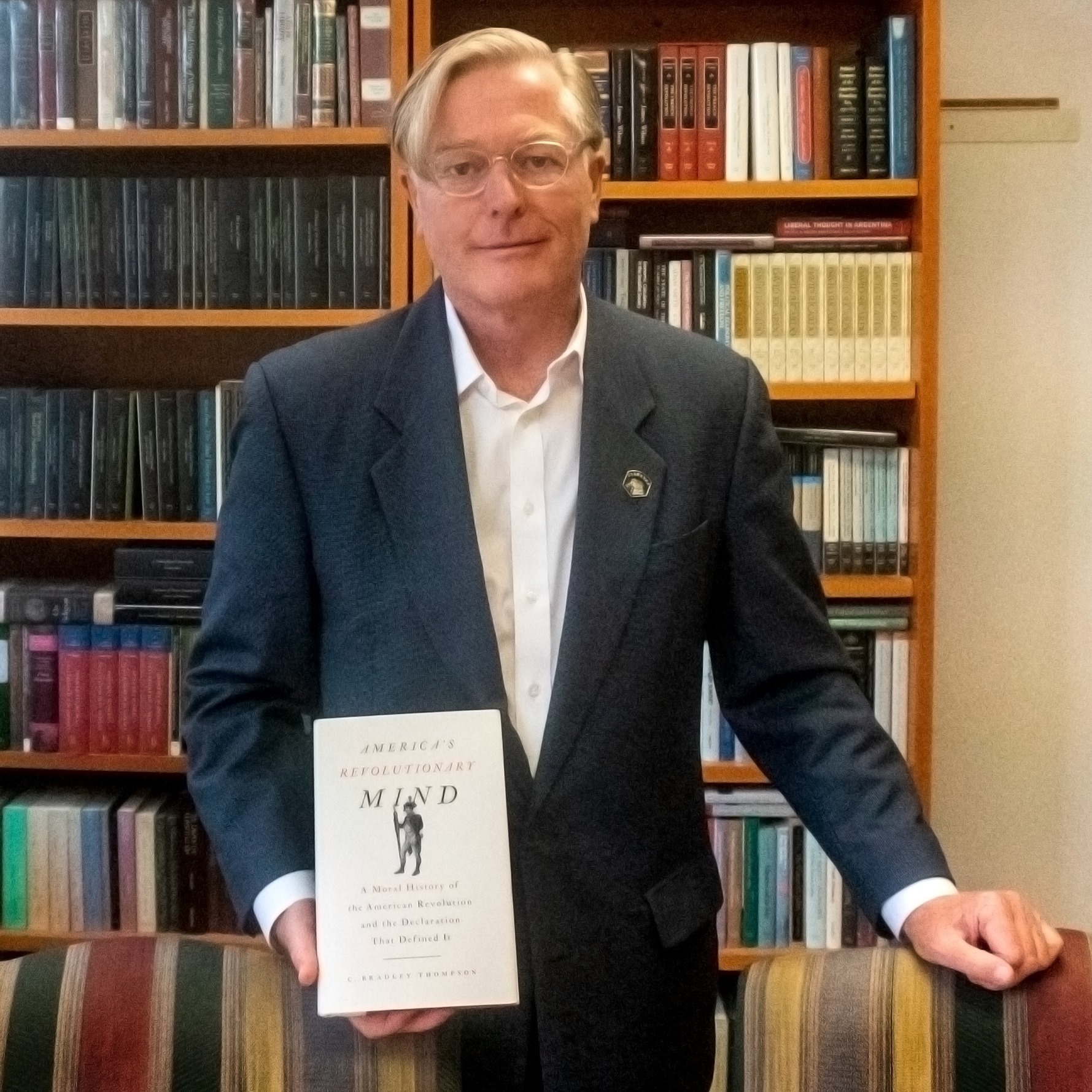風蕭蕭_Frank
以文會友Understanding Marxism: From Each According to His Ability
By C. Bradley Thompson
https://www.youtube.com/watch?v=qV27AGomwFA
About C. Bradley Thompson
The Redneck Intellectual
by | Dec 22, 2020 | Announcements

C. Bradley Thompson – author, professor and lecturer – has launched a new blog called The Redneck Intellectual.
Thompson is a Professor of Political Science at Clemson University, where he teaches political philosophy. He is also the Executive Director of the Clemson Institute for the Study Capitalism and the founder of the Lyceum Scholars Program.
The purpose of this blog is in Thompson’s own words: ” My goal is to rouse you from your dogmatic slumbers, to challenge you to think new thoughts, and to inspire you to live the best life possible.”
Subscribe to the blog here: https://cbradleythompson.substack.com/
Learn more about C. Bradley Thompson and follow him on social media here, here, and here.
Thompson is the author of four books:
America’s Revolutionary Mind: A Moral History of the American Revolution and the Declaration That Defined It
NEOCONSERVATISM: An Obituary for an Idea
Anti-Slavery Political Writings, 1833-1860
John Adams and the Spirit of Liberty
Understanding Marxism: From Each According to His Ability
https://www.youtube.com/watch?v=qV27AGomwFA
Private property, wage labor, competition, and profits — under Karl Marx's world view, these would have to go. Instead of self-interest, everybody would work for the benefit of everybody else. For many, this is a very seductive idea. Is this the dream we should aspire to? Or would it be a nightmare? C. Bradley Thomspon is the author of “The Redneck Intellectual” on Substack, and America’s Revolutionary Mind: A Moral History of the American Revolution and the Declaration that Defined It.
Script:
In a remarkably short period of time, the philosophy of Karl Marx changed the course of history.
At the height of its power, half the world fell under its dominion, kept there by a combination of fear, terror, and brute force.
Then suddenly in the late 1980’s, it imploded.
By all rights this should have been the end of Marxism. But it hasn’t turned out that way.
From environmentalism with its rejection of free markets to Critical Race Theory which sees white patriarchy as the source of all evil, you’ll find Marxism at its root. The leaders of Black Lives Matter, for example, openly acknowledge their devotion to Marxist ideology.
How do we explain this fascination for something that has so utterly failed everywhere it’s been put into practice?
We can find answers in one of Marx’s most enduring epigrams.
“From Each According to his Ability, to Each According to his Needs.”
Marx was a poor economist, but a talented journalist, the only actual job he ever had. He knew how to turn a phrase. But what does this slogan mean? According to what ability? According to what need? And who determines anyone’s ability or anyone’s need?
Marx never bothered to answer these obvious questions. He had much bigger things on his mind: nothing less than the creation of an entirely new kind of world for an entirely new kind of human being.
Marx believed that by altering man’s economic and political institutions, he could alter — or even better — rewire the human brain; he could conjure a new consciousness that would replace the old “false” one. This new man would be less selfish and acquisitive and more altruistic and communal. In short, he would be a superior type of man.
Of course, this new man could only reach this goal if he wasn’t preoccupied with having to earn money. According to Marx, money and the pursuit of it ruined everything. Marx hated money – maybe because he never found a way to make it. Getting rid of it was central to his world view. Once a person’s subsistence — one’s daily bread — was distributed on the basis of need rather than greed, man’s natural communal affections — long suppressed by his capitalist overlords — would be renewed.
This is Marx channeling the 18th century French social thinker Jean Jacques Rousseau, one of the few people Marx admired. According to Rousseau, this is what you must do if you want to create a new society.
“He who dares to undertake the making of a people’s institutions must feel himself capable of changing…human nature, of transforming each individual, who by himself is a complete and solitary whole, into a part of a larger whole, from which . . . the individual receives his life and his being…”
Understand this and you understand not only a key feature of Marxist thought, but the dark history of the twentieth century.
Marx took Rousseau literally: human nature had to be returned to its allegedly pure, selfless state before capitalism, with its Enlightenment and Judeo-Christian values, “corrupted” him.
But creating this “new man” would be a formidable task. Marx anticipated that many would object, especially the owners and managers that had a large stake in the capitalist system. Friendly persuasion wasn’t going to get the job done. Only the ruthless application of State power would be up to the task.
Marx was all for it.
Private property, wage labor, competition, and profits — these would have to go. The State, now run by the workers themselves — The Dictatorship of the Proletariat, as Marx called it — would control production and pricing. It would wisely manage the economy: from each according to his ability, to each according to his needs.
And imagine how wonderful it would be — no more ego, no more self-interest; instead, everybody working for the benefit of everybody else. Peace. Love. Harmony.
For the complete script, visit: https://www.prageru.com/video/underst...
認識馬克思主義:各盡所能
https://www.youtube.com/watch?v=qV27AGomwFA
私有財產、雇傭勞動、競爭和利潤——在卡爾馬克思的世界觀下,這些都必須消失。每個人都不會為自己的利益而工作,而是為其他人的利益而工作。對許多人來說,這是一個非常誘人的想法。這是我們應該追求的夢想嗎?還是會是一場噩夢? C. Bradley Thomspon 是 Substack 上的“鄉巴佬知識分子”和美國革命思想:美國革命的道德史和定義它的宣言的作者。
腳本:
在極短的時間內,卡爾·馬克思的哲學改變了曆史進程。
在它權力的頂峰時期,半個世界都落入了它的統治之下,被恐懼、恐懼和蠻力相結合。
然後在 1980 年代後期突然爆發。
無論如何,這應該是馬克思主義的終結。但事實並非如此。
從拒絕自由市場的環保主義到將白人父權製視為萬惡之源的批判種族理論,你會發現馬克思主義的根源。例如,Black Lives Matter 的領導人公開承認他們對馬克思主義意識形態的忠誠。
我們如何解釋這種對在任何地方都完全失敗的東西的迷戀?
我們可以在馬克思最經久不衰的警句之一中找到答案。
“各盡所能,各取所需。”
馬克思是一個貧窮的經濟學家,但卻是一個才華橫溢的記者,是他唯一一份真正的工作。他知道如何轉詞。但是這個口號是什麽意思?根據什麽能力?根據什麽需要?誰決定了任何人的能力或任何人的需求?
馬克思從不費心回答這些顯而易見的問題。他有更宏大的事情在想:無非是為一個全新的人類創造一個全新的世界。
馬克思相信,通過改變人類的經濟和政治製度,他可以改變——甚至更好地——重新連接人類大腦。他可以召喚出一種新的意識來取代舊的“虛假”意識。這個新人將不那麽自私和貪婪,而是更加利他和社區。簡而言之,他將是一個優秀的人。
當然,這個新人隻有在不忙於賺錢的情況下才能達到這個目標。根據馬克思的說法,金錢和對金錢的追求毀了一切。馬克思討厭錢——也許是因為他從來沒有找到賺錢的方法。擺脫它是他世界觀的核心。一旦一個人的生計——一個人的日常麵包——根據需要而不是貪婪來分配,人類長期以來被資本主義霸主壓製的自然的公共感情就會得到更新。
這是馬克思對 18 世紀法國社會思想家讓·雅克·盧梭的引導,他是馬克思欽佩的少數人之一。盧梭認為,如果你想創建一個新的社會,這是你必須做的。
“敢於建立人民製度的人必須感到自己有能力改變……人性,將每個單獨的個體轉變為一個更大的整體的一部分,從中…… . .個人接受他的生命和他的存在……”
理解這一點,你不僅理解了馬克思主義思想的一個關鍵特征,而且理解了二十世紀的黑暗曆史。
馬克思從字麵上理解了盧梭:在資本主義以其啟蒙運動和猶太-基督教價值觀“腐蝕”他之前,人性必須回到其所謂的純粹、無私的狀態。
但創造這個“新人”將是一項艱巨的任務。馬克思預計許多人會反對,尤其是在資本主義製度中擁有大量股份的所有者和管理者。友好的勸說不會完成工作。隻有無情地運用國家權力才能勝任這項任務。
馬克思完全讚成。
私有財產、雇傭勞動、競爭和利潤——這些都必須消失。現在由工人自己管理的國家——馬克思稱之為無產階級專政——將控製生產和定價。它將明智地管理經濟:各盡所能,各取所需。
想象一下這將是多麽美妙——不再自負,不再自私;相反,每個人都在為其他人的利益而工作。和平。愛。和諧。




